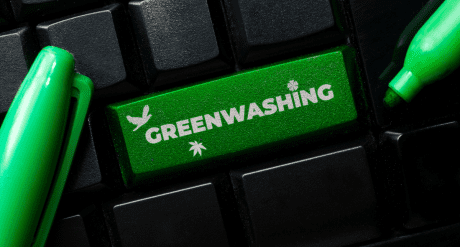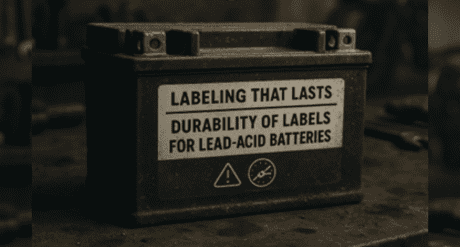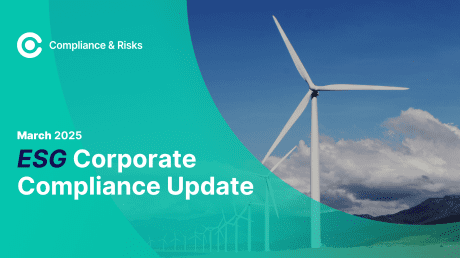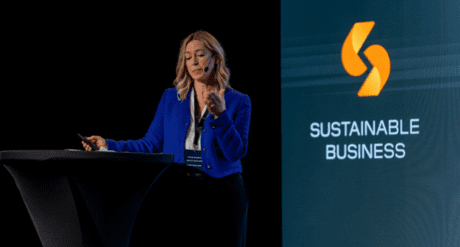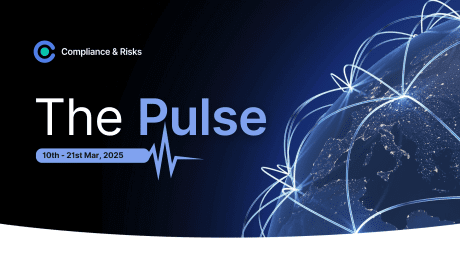
What’s Trending In Compliance? (April 2022)
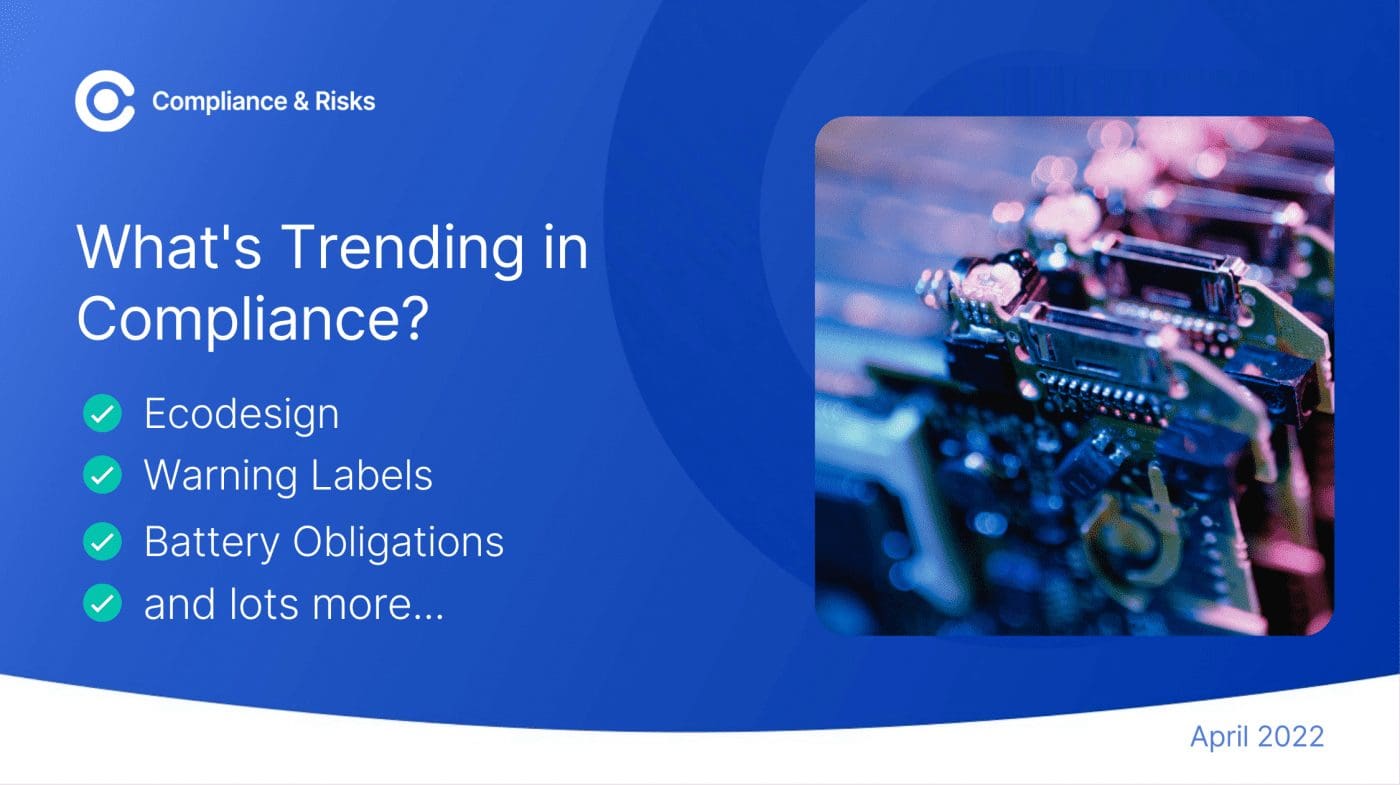
At Compliance & Risks we help manufacturers, retailers and their supply chain partners to monitor and manage global regulations via C2P, our compliance knowledge management platform.
These are some of the top trending topics that generated the most interest in the last month.
1. EU: Proposed Framework For Setting Ecodesign Requirements For Sustainable Products, Draft Regulation, March 2022
The aim of this groundbreaking proposal put forward by the EU Commission is to make sustainable products the norm on the EU market, thereby reducing the environmental and climate impact of products.
It will apply to the widest possible range of products, using the successful ‘Ecodesign approach’ to set product-level requirements that not only promote energy efficiency but also circularity and overall reduction of environmental and climate impacts.
These requirements will be set in product-specific legislation and will encompass rules to make them more durable, reliable, reusable, upgradable, reparable, easier to maintain and refurbish, and energy and resource efficient.
Additionally, they could address the substances that inhibit circularity or amount of recycled content products contain, as well as ways to make them easier to remanufacture and recycle.
The proposal also foresees Digital Product Passports being rolled out for all regulated products, thereby enabling consumers to know more about the impacts of the products on their shelves and to make more sustainable choices.
Further, the proposal incentivises sustainable products and enables mandatory green public procurement criteria to be set, making use of contracting authorities’ economic power.
A preliminary assessment by the Commission has identified that product categories such as textiles, furniture, mattresses, tyres, detergents, paints, lubricants, as well as intermediate products like iron, steel and aluminium, have high environmental impact and may be among the first products targeted.
2. France: Procedure for Registering Producers and Issuing Their Unique Identifier Within the Framework of Extended Producer Responsibility, Order, March 2022
This Order, which entered into force on 24 March 2022, sets out the information to be submitted to ADEME (French Environment & Energy Management Agency), by means of the tele-service called SYDREP, in order to register and obtain a unique REP identifier.
Producers subject to the principle of extended producer responsibility must, pursuant to Article L. 541-10 of the Environmental Code, register with the administrative authority, ADEME, which issues them a unique identifier.
The following information, for each of the REP sectors listed in Article L. 541-10-1 which covers those of the producers’ products subject to the REP obligation, must be submitted:
- Company name and SIREN or SIRET number of the head office in the case of a resident company. For a non-resident company, its intra-Community value added tax number or its registration number with the tax authorities of its country of residence, indicating said country, must be supplied;
- The code characterising its main activity according to the nomenclature of French activities for a resident company;
- The name and SIREN or SIRET number of the head office of the eco-organisation to which it belongs or, when it has set up an individual system, the reference of the approval order for the individual system;
- From 1 January 2023, when a sector includes several categories of products covered by separate approvals, the categories of products concerned should be specified.
If the producer joins an eco-organisation, this eco-organisation carries out the process of registration of the producer in the register and transmits the information indicated above.
3. Chile: Collection, Recovery Targets and Associated Obligations for Batteries and Electrical and Electronic Equipment, Draft Decree, March 2022
On 10 March, the Chilean Ministry of the Environment published Resolution No. 207 in order to propose a Preliminary Bill on Collection and Recovery Targets and Associated Obligations for Batteries and Electrical and Electronic Equipment.
This Preliminary Bill establishes collection and recovery targets and associated obligations for batteries and electrical and electronic equipment and other obligations in order to prevent the generation of waste and to encourage its reuse or recovery.
Per Article 3, it proposes to regulate all batteries and EEE placed on the market, with the following exceptions, as defined:
- Electrical and electronic devices that are necessary for the protection of the essential interests of national security, including weapons, ammunition and war material, intended for specifically military purposes;
- Electrical and electronic devices that are designed and specifically installed as part of an apparatus excluded or not included in the scope of application of this decree;
- Large-scale stationary industrial tools;
- Large fixed installations;
- Means of transport for people or goods, excluding electric two-wheelers that do not require a circulation permit;
- Off-road mobile machinery intended exclusively for professional use;
- Apparatus specifically designed for the sole purpose of research and development, which are intended exclusively for a professional use;
- Batteries whose composition is lead-acid;
- Batteries used for means of transport for people or goods weighing more than 5 kilograms.
Producers subject to extended responsibility must comply with the obligations described in Article 8:
- register with RETC
- organise and finance the collection of waste batteries and electrical and electronic equipment throughout the national territory, as well as its storage, transport and treatment
- comply with collection and recovery goals in accordance with Title III;
- comply with associated obligations described in Title IV;
- ensure waste management is performed by authorised and registered managers
This Preliminary Bill is under Public Consultation until 22.04.2022.
4. New Hampshire (USA): Warning Labels on Consumer Products Containing Perfluorinated Chemicals, House Bill 1422, 2022
This Bill, proposed on 15 March 2022, provides, inter alia, that a manufacturer, producer, packager, importer, supplier, or distributor of a PFAS consumer product or PFAS packaging must do one of the following:
- Beginning January 1, 2024, provide on the product label or labelling a warning that meets the requirements as set out in paragraph III.
- By January 1, 2024, and annually thereafter, provide a written notice directly to the authorised agent for a retail seller that sells the product in this state and obtain written confirmation of receipt of the notice. The notice shall meet all of the following requirements:
- State that the product or the product’s packaging may result in exposure to PFAS, an organic chemical containing at least one fully fluorinated carbon atom.
- Include the exact name or description of the product or specific identifying information for the product such as a universal product code.
- Be accompanied by labels or labelling that meet the requirements of section 5 and, for a product to be sold by the retailer on the Internet, warning language that meets the requirements of section 5.
5. Brazil: Approving Conformity Assessment Requirements for Plugs and Sockets, Portaria No. 90, 2022
On 22 March 2022, the Brazil National Institute of Metrology, Standardisation and Industrial Quality (INMETRO/CONMETRO) published Portaria No. 90 to approve the Requirements for Conformity Assessment of Plugs and Sockets.
This Portaria approves the regulation for plugs and sockets, with respect to the applicable conformity assessment requirements and the specifications for the Conformity Identification Mark, detailed in Annexes I and II.
The Regulation establishes conformity assessment criteria and procedures for plugs and sockets of domestic and analogous use, through the mechanism of certification, aiming at the safety and the prevention of accidents in its use.
It applies to all plugs and sockets, fixed or mobile, for voltages up to 250V and current up to 20A, as indicated in Figures 1a and 1b of ABNT NBR NM 60884-1:2010, including:
- multiple mobile sockets and the non-dismountable plug incorporated into a flexible cable, parts of the commonly known extensions, as indicated in Figure 1b of ABNT NBR NM 60884-1:2010;
- non-dismountable plugs or non-dismountable mobile sockets incorporated into flexible cables, called connector cords and extension cords according to Figure 1a of ABNT NBR NM 60884-1:2010;
- plugs, sockets, extension cords and connector cords, for specific use in the maintenance and/or replacement of electrical, electronic or electro-electronic appliances.
According to Article 5 plugs and sockets, manufactured, imported, distributed and sold in the national territory, free of charge or not, must be compulsorily submitted to the conformity assessment, by means of the certification mechanism.
As of 1 April 2022, the manufacturers and importers shall adopt, in new certification processes of plugs and sockets, the conditions and layout of the Conformity Identification Seal according to Model 1 of Annex II of this Portaria.
Portaria No. 90 came into force on 1 April 2022.
This information is based on the most viewed regulations on C2P this month. If you would like to find out more about how you can stay on top of global regulations, why don’t you Book a Demo today?
Market Insights straight to your inbox
Join 30,000+ product compliance & market access experts around the world
